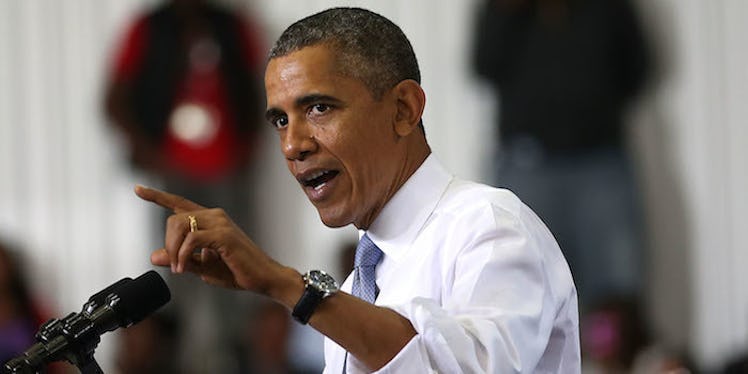
Obama's Selma Speech Defined America As Millennials See It
President Obama delivered perhaps the greatest speech of his career on Saturday, commemorating the 50th anniversary of "Bloody Sunday" and the Selma to Montgomery march.
While he was giving it, I was admittedly still wearing pajamas, eating Cinnamon Toast Crunch and catching up on "House of Cards."
By the end of the day, essentially every single headline or tweet I encountered on the speech suggested I'd missed one of the defining moments of Obama's presidency.
Covering and listening to hundreds of Obama speeches over the last decade, I can't recall one that is better than his Selma speech today. — Jeff Zeleny (@jeffzeleny) March 7, 2015
Obama turning Selma commemoration speech into celebration of American virtue. — John Harwood (@JohnJHarwood) March 7, 2015
Selma speech seems like the closest we've been to unfiltered Obama in a while. — Bryan Maygers (@bmaygers) March 7, 2015
I typically dedicate Saturday to laundry and Netflix, but I was too intrigued by all of the buzz not to give it a watch.
By the time I was done streaming the speech, it quickly became apparent why it'd received such high praise.
If you truly love your country, you have to be critical of it.
President Obama weaved a vision of this nation as I believe my generation sees it: America is not just a country, but a complex and incomplete idea that has yet to be fully realized.
Most of all, Obama was refreshingly candid about this country's convoluted and often reprehensible past. By speaking honestly about America, he somehow left you feeling decidedly more hopeful about its capacity to evolve.
Simply put, President Obama outlined America's future by highlighting the ways in which its flaws and mistakes have served as a catalyst for progress. He proved that self-criticism and patriotism are not mutually exclusive ideas.
Specifically, Obama described the way in which young people came to Selma and led the charge for change in America.
The president stated:
The American instinct that led these young men and women to pick up the torch and cross this bridge is the same instinct that moved patriots to choose revolution over tyranny. It's the idea held by generations of citizens who believed that America is a constant work in progress; who believed that loving this country requires more than singing its praises or avoiding uncomfortable truths. It requires the occasional disruption, the willingness to speak out for what's right and shake up the status quo. ...If Selma taught us anything, it's that our work is never done – the American experiment in self-government gives work and purpose to each generation.
In speaking these words, the president issued a subtle call to action to all Millennials: Be like those brave young people in Selma in 1965. Be the leaders of tomorrow.
If we don't vote, we have no right to complain about anything.
Generation-Y is the largest and most diverse generation in American history.
Accordingly, its politics are certainly not homogenous. There are Republicans, Democrats and Independents alike within this generation.
One thing is for certain, however, and it's that Millennials are fed up with false patriotism.
We're tired of the uncritical, sugarcoated versions of American history. We realize our country is a work in progress, and its many flaws are not indicative of its ultimate potential.
We recognize that while you may not agree on how to approach certain issues, you at least have to be willing to entertain opposing ideas. In other words, we understand the importance of compromise.
Thus, we're also extremely fed up with the polarized nature of America's political culture. Perhaps this explains our ostensible lack of interest in politics, and why an embarrassingly low number of Millennials voted in midterms.
Yet, we really have no right to complain about the current state of affairs until we become more politically engaged.
If you're unfamiliar with the events that occurred in Selma in 1965, civil rights activists were marching in support of providing full voting rights to minorities.
At that time, minority groups were habitually disenfranchised by ludicrous and discriminatory laws.
Dr. King organized a march from Selma to Montgomery to bring national attention to the issue. When marchers attempted to cross the Edmund Pettus Bridge, however, they were brutally attacked by police.
The shocking incident became known as "Bloody Sunday," and it garnered international support for the Civil Rights Movement.
Moreover, it ultimately led to the Voting Rights Act, which protects the voting rights of all citizens.
Indeed, in 1965, people were willing to lay life and limb on the line in order to secure the right to vote.
Yet, as President Obama put it on Saturday:
Fifty years ago, registering to vote here in Selma and much of the South meant guessing the number of jellybeans in a jar or bubbles on a bar of soap. It meant risking your dignity, and sometimes, your life. What is our excuse today for not voting? How do we so casually discard the right for which so many fought? How do we so fully give away our power, our voice, in shaping America's future?
Gen-Y has been characterized as a lazy, entitled and disengaged generation. As a member of this generation, I know that's not true. Like the United States, Millennials have their flaws, but we are not a lost cause.
We have remained resilient through the Great Recession, and have a fundamentally optimistic view of the world.
Millennials also comprise the most educated generation in American history.
Simply put, my generation has immense potential to change this country for the better.
We could begin by exercising our right to vote.
Citations: Read The Full Transcript Of Obamas Powerful Speech In Selma (Huffington Post)